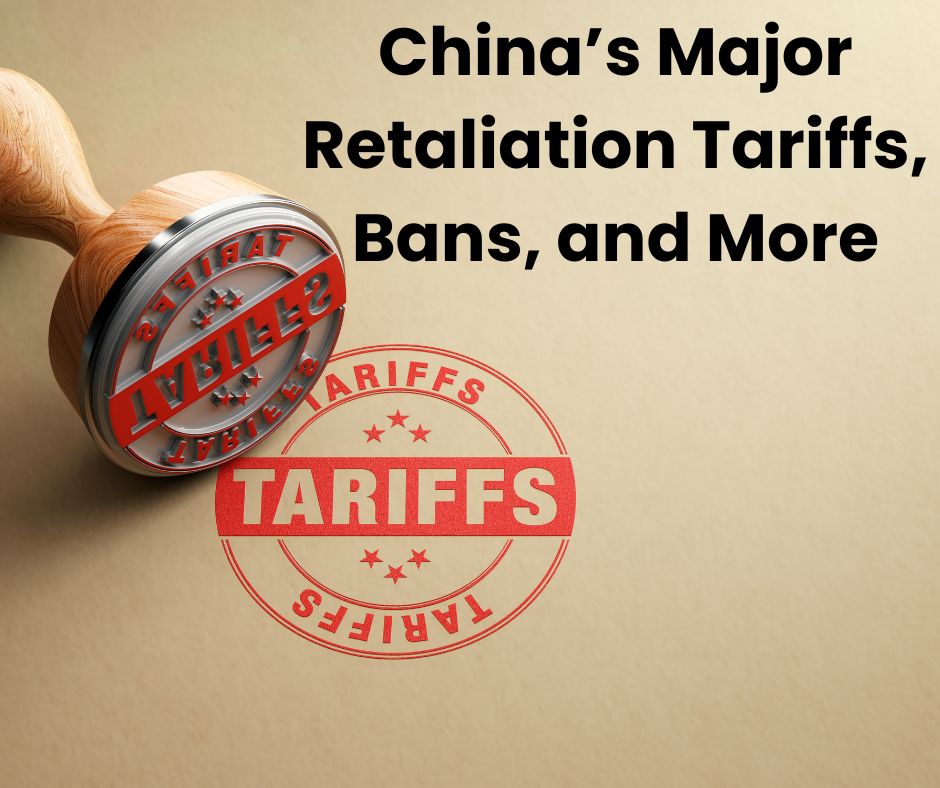China’s Major Retaliation Tariffs, Bans, and More

In response to the United States' recent tariff hikes—including a blanket 10% tariff on all imports and specific tariffs up to 104% on Chinese goods—China has launched a suite of retaliatory trade measures. These actions have heightened the tensions between the world's two largest economies, amplifying the already precarious global economic situation.
- Massive Tariff Increase: China has raised tariffs on U.S. imports to 84%, up from an earlier 34%, affecting a wide range of American goods. This significant increase has placed immense pressure on U.S. exporters, particularly in sectors like agriculture, technology, and consumer goods.
- Export Ban on Critical Minerals: China imposed export controls on a range of strategic rare earth elements—including dysprosium, terbium, yttrium, gadolinium, lutetium, samarium, and scandium—which are crucial for U.S. industries such as defence, clean energy, and advanced electronics. This move has the potential to disrupt key U.S. supply chains, including for electric vehicles, wind turbines, and precision military technologies. The absence of these minerals could lead to severe shortages in industries that rely heavily on them, increasing production costs and slowing down technological advancements.
- Blacklisting of U.S. Firms: China has added 18 major U.S. companies to its "unreliable entities" list, effectively banning them from trade and investment activities within China. Among the companies on this list are high-profile names in technology, finance, and manufacturing. This move threatens their access to one of the world's largest and fastest-growing consumer markets, potentially causing billions of dollars in lost revenue.
- Regulatory Pressure: Chinese regulators have initiated antitrust and compliance probes into prominent American corporations operating in China, increasing scrutiny and operational challenges. These probes could lead to regulatory fines, heightened compliance costs, and even forced business closures, further complicating the already delicate relationship between the two countries.
- Hollywood Movie Ban: In a further escalation of tensions, China has announced a ban on Hollywood films, marking a major shift in its cultural diplomacy. This measure is seen as a direct response to the U.S.'s stance on China’s global economic influence. The ban is expected to have a profound financial impact on the Hollywood industry, which relies heavily on international box office revenues.
- Strategic Economic Planning: High-level Chinese government meetings are being convened to coordinate further policy responses, stabilize domestic markets, and offset the impact of U.S. tariffs. These discussions are expected to include measures aimed at boosting domestic production in critical sectors, diversifying trade relationships, and enhancing China's geopolitical standing by strengthening ties with other countries.
These coordinated actions represent a significant escalation in the U.S.-China trade conflict, with global supply chains and economic stability hanging in the balance. The impact of these retaliatory measures, especially when combined with rising tariffs and the Hollywood movie ban, could have lasting repercussions on both economies and the global market at large. As both nations dig in their heels, the likelihood of a prolonged trade war grows, further destabilizing global economic conditions.